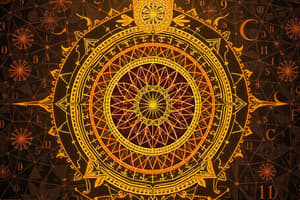Podcast
Questions and Answers
What is the general form of a complex number?
What is the general form of a complex number?
- a * bi
- a - bi
- a + bi (correct)
- a / bi
Which operation is NOT defined for complex numbers?
Which operation is NOT defined for complex numbers?
- Multiplication
- Addition
- Division
- Square root (correct)
What does the determinant of a matrix help determine?
What does the determinant of a matrix help determine?
- The rank of the matrix
- The eigenvalues of the matrix
- The dimensions of the matrix
- The invertibility of the matrix (correct)
What geometric representation is used for complex numbers?
What geometric representation is used for complex numbers?
Which mathematical concept does calculus primarily deal with?
Which mathematical concept does calculus primarily deal with?
What does the dot product of two vectors indicate?
What does the dot product of two vectors indicate?
What is a key application of matrices?
What is a key application of matrices?
Which of the following is a common method used in linear programming?
Which of the following is a common method used in linear programming?
Flashcards
What is a complex number?
What is a complex number?
A complex number is a number that can be expressed in the form a + bi, where 'a' and 'b' are real numbers, and 'i' is the imaginary unit (i² = -1).
What is the modulus of a complex number?
What is the modulus of a complex number?
The modulus of a complex number is its distance from the origin in the complex plane. It's often denoted as |z|.
What is a matrix?
What is a matrix?
Matrices are rectangular arrays of numbers that can be used to represent linear transformations and systems of linear equations.
What is a vector?
What is a vector?
Signup and view all the flashcards
What is calculus?
What is calculus?
Signup and view all the flashcards
What is partial differentiation?
What is partial differentiation?
Signup and view all the flashcards
What are sequences and series?
What are sequences and series?
Signup and view all the flashcards
What is linear programming?
What is linear programming?
Signup and view all the flashcards
Study Notes
Core Concepts
- Further mathematics builds upon fundamental mathematical concepts, providing a deeper understanding and more advanced techniques.
- It includes complex numbers, matrices, vectors, and calculus, often extending beyond A-level mathematics.
- A strong grasp of prior mathematical knowledge is essential.
Complex Numbers
- Complex numbers expand real numbers to include imaginary numbers.
- A complex number is written as a + bi, where 'a' and 'b' are real numbers, and 'i' is the imaginary unit (i² = -1).
- Operations like addition, subtraction, multiplication, and division are defined for complex numbers.
- The modulus of a complex number, denoted as |z|, is its distance from the origin in the complex plane.
- Complex numbers are graphically represented on an Argand diagram.
- De Moivre's theorem links complex numbers and trigonometry.
- Polynomial equations can have complex roots.
Matrices
- Matrices are rectangular arrays of numbers.
- Matrices represent and manipulate linear transformations and systems of linear equations.
- Matrix operations include addition, subtraction, multiplication, and finding the inverse.
- The determinant of a matrix is crucial for certain operations and determining invertibility.
- Matrix applications include computer graphics and engineering.
Vectors
- Vectors represent quantities with magnitude and direction.
- Vector operations include addition, subtraction, scalar multiplication, and dot product calculations.
- The dot product measures the alignment of two vectors.
- Vectors represent physical quantities like force and displacement.
- Vectors are geometrically represented on a coordinate plane.
Calculus
- Calculus extends A-level concepts.
- Further calculus topics include partial differentiation, multiple integration, and finding maxima/minima of multivariable functions.
- Understanding sequences and series is vital in calculus.
Other Important Topics
- Linear programming involves complex constraints and optimization techniques.
- Differential equations describe rates of change.
- Proof techniques like mathematical induction are crucial in further mathematics.
Exam Preparation
- Thorough understanding of core concepts and theorems is essential.
- Practicing and applying learned techniques significantly boosts performance.
- Reviewing past papers helps to identify common exam questions and improve timing for accurate and efficient exam completion.
- Effective exam strategies are frequently important.
- Practice exams reveal strengths and weaknesses, directing focused preparation.
Studying That Suits You
Use AI to generate personalized quizzes and flashcards to suit your learning preferences.




